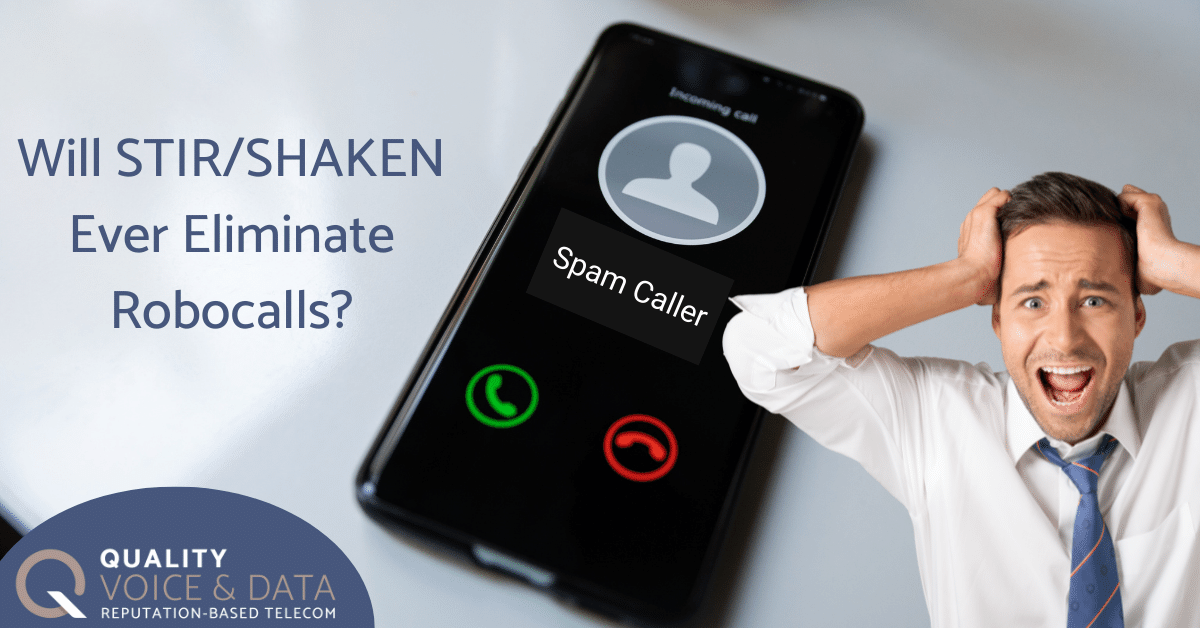Will STIR/SHAKEN Attestation Levels Ever Eliminate Robocalls?
Consumers and legitimate businesses have long decried the curse of robocalls. They are time-consuming and wildly annoying to consumers. In fact, 8 out of 10 American consumers are unlikely to answer a call that's origin is unknown. These calls also affect legitimate businesses that suffer from consumer mistrust of anonymous calls. The FCC fields thousands of complaints about these robocalls every year. Everyone (except the robocallers) agrees that they need to end.
Consumers and businesses hoped that when the STIR/SHAKEN Attestation Levels system was partially implemented in 2021, it would eliminate or at least minimize robocalls. That hope has not yet been realized. The frustrating fact is that as of October 2022, robocalls were 7.68% of all calls placed — hardly the desired results.
So why are robocalls still a thing? Is STIR/SHAKEN not working as intended? The answer is complicated and involves several important factors. While the legislation is not fully working yet, the full implementation of the legislation should bring better results.
STIR/SHAKEN Attestation: Extended Implementation Deadlines
The STIR/SHAKEN legislation did not go into immediate effect, and some service providers had different deadlines. Larger carriers had an implementation deadline of June 30, 2021, for the IP part of their networks. Smaller carriers with 100,000 or fewer subscriber lines were given an extension until June 20, 2023, to complete implementation, although that extension may be shortened for some providers.
Full compliance with SHAKEN is still some time away. Since not all carriers are signing calls at this point, some robocallers continue to get away with their illegal activity. In October 2022, only about 23%–24% of calls were transmitted with a SHAKEN token. Less than one-quarter compliance ensures that consumers will continue to be plagued with robocalls, at least in the short term. As implementation percentages rise, the number of robocalls should fall.
STIR/SHAKEN Attestation Levels
Another problem concerns STIR/SHAKEN attestation levels. A call is assigned an A, B, or C rating to indicate its validity. Bad actors use various methods, such as spoofing, to deliver their illegitimate calls to consumers. The attestation ratings are meant to expose these ploys and protect consumers and businesses from robocallers.
Calls with a SHAKEN token and an A attestation are trusted calls delivered to the called party without being blocked or labeled. B attestation, or partial attestation, means the service provider can authenticate the call’s origins but cannot determine if the caller is authorized to use the calling number.
The real problem comes with a C attestation. In this case, the terminating carrier cannot determine who originated the call or if they are authorized to use the caller ID number. C-rated calls simply cannot be trusted. According to Transnexus, calls signed with a C are almost five times more likely to be robocalls. Too many calls are still going through with a STIR/SHAKEN attestation C rating, and unwary consumers may still answer them.
Fewer Future Robocalls
While the current statistics are discouraging, there is good news. More terminating carriers are utilizing the SHAKEN token and identifying if the attestation is an A, B, or C. Again, calls with a SHAKEN token and an A attestation are trusted calls delivered to the called party without blocking or labeling. And calls with a C are most likely to be blocked or labeled.
Each wireless carrier has relationships with companies that provide data that helps them make blocking and labeling decisions on a call-by-call basis. When an individual receives a call from a questionable phone number, the call will be labeled as “Spam Likely” — a call most people will not answer. So the SHAKEN token does work to minimize robocalls. When the percentage of carrier implementation goes up, the number of robocalls should fall significantly.
The Quality Voice & Data Advantage
QVD is one of a very small number of SHAKEN service providers. We help our customers ensure their calls are not blocked or labeled by the called party's carrier, an invaluable service in this time of consumer suspicion and illegitimate calls.
Our customers need a SHAKEN service provider that can sign their calls with an A attestation. At QVD, we sign 100% of our customer calls with an A attestation. 100%! Our customers currently have a significant competitive advantage because, in the industry, only 15%–16% of calls are signed with an A as of October 2022. Many legitimate calls are not getting through.
At Quality Voice & Data, we provide Trusted Call Completion(R) for call centers, outbound teleservices (sales) organizations, and other legitimate companies that need to contact existing customers or prospects. With our help, you will convert a higher number of your calls.
Learn more about our service by calling or filling out a brief online form. In addition to a no-obligation consultation, you can request a free STIR/SHAKEN Attestation Test. Your company's success relies on the security of a STIR/SHAKEN A attestation for your calls. Let us help you today!
Angela Garfinkel currently serves as Director for Quality Voice & Data. With 30+ years of call center and business process outsourcing experience, Angela provides the QVD team with key insights to support product development, marketing and sales.
Angela Garfinkel, Director at Quality Voice and Data, brings over 30 years of experience in call center and business process outsourcing. Well known in the telemarketing and telecommunications industry, she co-authored a course for The Direct Marketing Association and actively participates in professional groups like PACE. Her educational background includes an MBA and an undergraduate degree in Telecommunications Management from the University of Nebraska.


